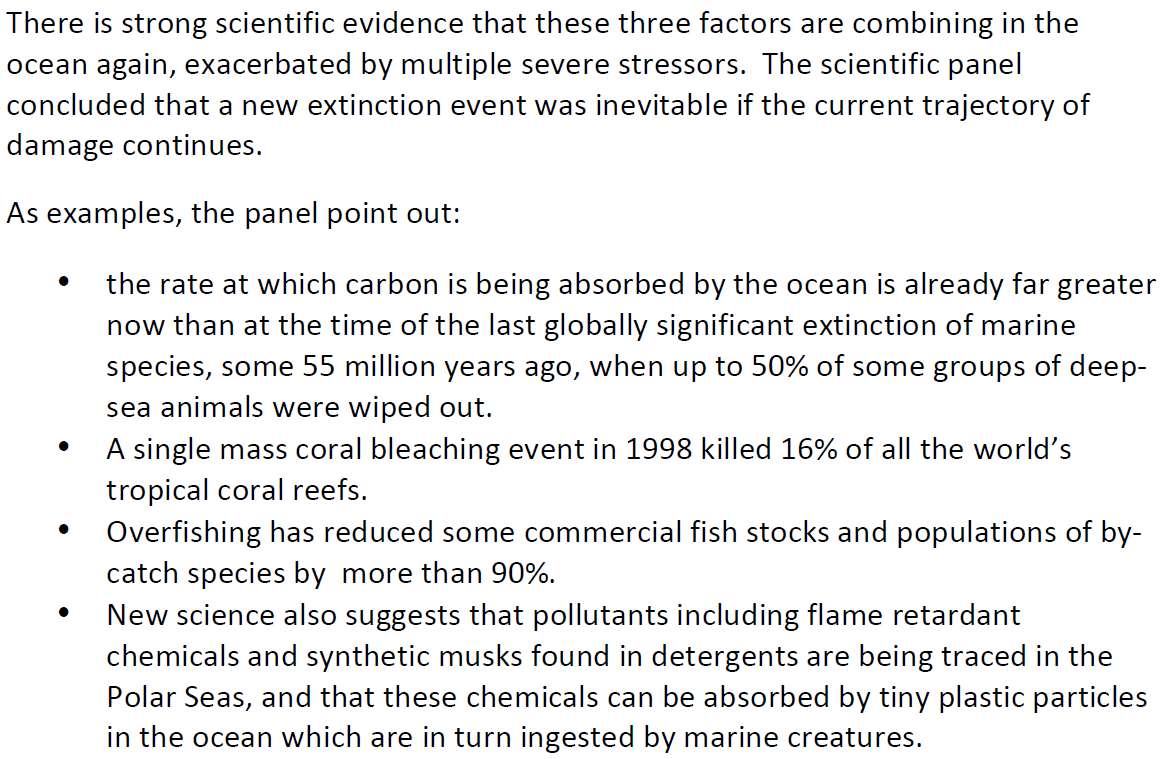It looks like you're using an Ad Blocker.
Please white-list or disable AboveTopSecret.com in your ad-blocking tool.
Thank you.
Some features of ATS will be disabled while you continue to use an ad-blocker.
1
share:
MULTIPLE OCEAN STRESSES THREATEN "GLOBALLY SIGNIFICANT" MARINE EXTINCTION
A high-level international workshop convened by IPSO met at the University of Oxford earlier this year. It was the first inter-disciplinary international meeting of marine scientists of its kind and was designed to consider the cumulative impact of multiple stressors on the ocean, including warming, acidification, and overfishing.
The 27 participants from 18 organisations in 6 countries produced a grave assessment of current threats - and a stark conclusion about future risks to marine and human life if the current trajectory of damage continues: that the world's ocean is at high risk of entering a phase of extinction of marine species unprecedented in human history.
Delegates called for urgent and unequivocal action to halt further declines in ocean health.
The final report wil be released sooner, however, a report summary on major ocean impacts and stressors was released last week and its conclusion is unequivocal: the world's ocean is at high risk of entering a phase of extinction of marine species unprecedented in human history.
The report is also accompanied by four case studies, which look in more detail at some of the workshop's main findings.
Case Study 1
The potentially deadly trio of factors — warming, acidification and anoxia — affecting today's oceans, by Professor Jelle Bijma, Marine Biogeosciences, Alfred Wegener Institute for Polar and Marine Research. Watch his explanation, beginning with the growing problem of anoxia, or dead zones, in the ocean.
Case Study 2
End of paradise: Coral reefs facing multiple attacks, by Ove Hoegh-Guldberg , Director, Global Change Institute, University of Queensland
Read the two other case studies in detail here
Sources: state of the ocean
short report
long report (including names, titles, organisations and email adresses of the workshop participants)
Extracts of the short report:


This is really bad news, is the process reversible? I don't want to be pessimist, but how can we say to China and India (for example) poor people to use ecologic solutions for live? We can't blame them for tying to duplicate our 'civilization model'.
Where are we going?
edit on 24-6-2011 by elevenaugust because: (no reason given)
this kind of ties in with "dead zones" in the ocean, where there is not enough oxygen in the water to sustain life. there used to be very few of
these places, but in recent years they are growing larger and becoming more numerous. very disturbing.
people don't seem to realize we only have one planet.
people don't seem to realize we only have one planet.
reply to post by Bob Sholtz
Many thanks for your reply!
Yes, and I don't want to be too controversial, but only one reply here for something that I thought to be crucial for the future of our Earth demonstrate, sadly, that you're absolutely right.
Nobody seems to care, or maybe it's me? Or maybe it's the week-end?
Many thanks for your reply!
people don't seem to realize we only have one planet.
Yes, and I don't want to be too controversial, but only one reply here for something that I thought to be crucial for the future of our Earth demonstrate, sadly, that you're absolutely right.
Nobody seems to care, or maybe it's me? Or maybe it's the week-end?
There's been a few threads lately saying what this thread is saying.
Our oceans are dying.
Our oceans are dying.
new topics
-
What is the white pill?
Philosophy and Metaphysics: 24 minutes ago -
Mike Pinder The Moody Blues R.I.P.
Music: 1 hours ago -
Putin, Russia and the Great Architects of the Universe
ATS Skunk Works: 4 hours ago -
A Warning to America: 25 Ways the US is Being Destroyed
New World Order: 8 hours ago
top topics
-
President BIDEN's FBI Raided Donald Trump's Florida Home for OBAMA-NORTH KOREA Documents.
Political Conspiracies: 14 hours ago, 32 flags -
A Warning to America: 25 Ways the US is Being Destroyed
New World Order: 8 hours ago, 14 flags -
Is AI Better Than the Hollywood Elite?
Movies: 16 hours ago, 4 flags -
Mike Pinder The Moody Blues R.I.P.
Music: 1 hours ago, 2 flags -
Maestro Benedetto
Literature: 15 hours ago, 1 flags -
Putin, Russia and the Great Architects of the Universe
ATS Skunk Works: 4 hours ago, 1 flags -
What is the white pill?
Philosophy and Metaphysics: 24 minutes ago, 1 flags
1
